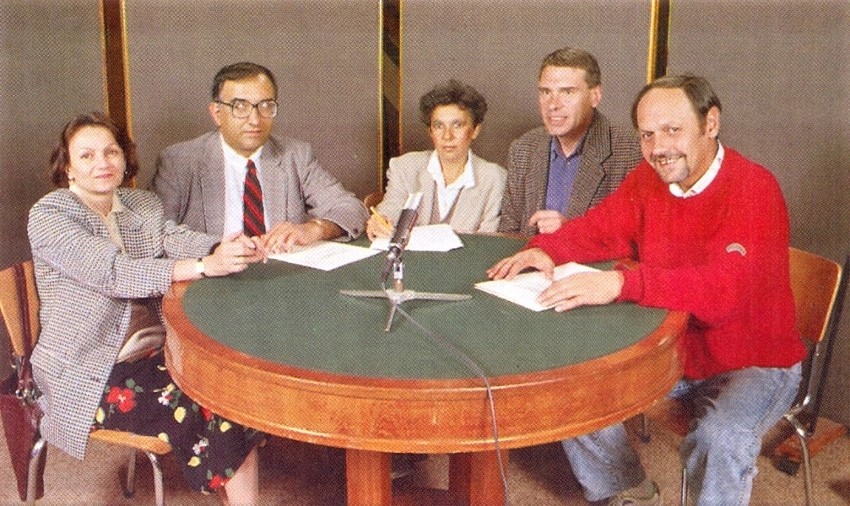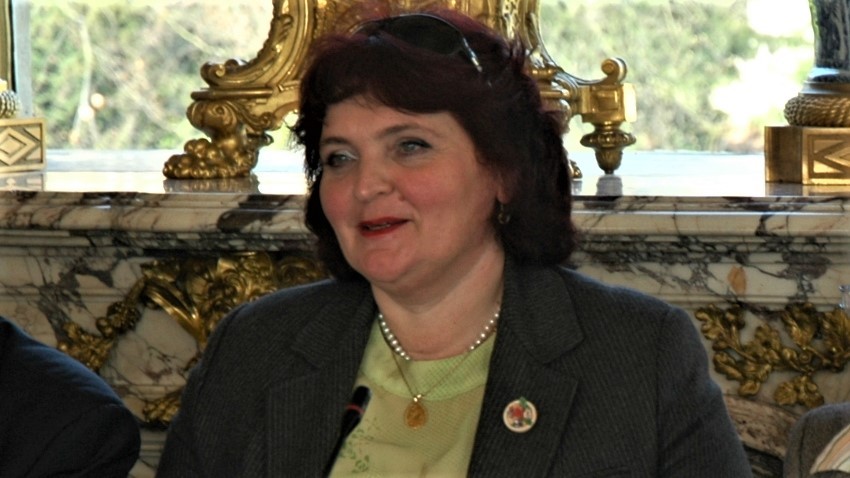Like pieces of a jigsaw puzzle - each with its own shape, features and unique place, translators and journalists arrange the colourful history of the BNR foreign-language programmes - Radio Bulgaria. In love with their work for 85 years, they tell people around the world in their language about the life in this country in all its aspects. An important part of the history of the media is the French translator and long-time head of the French editorial department at Radio Bulgaria, Ivan Avuski - a professional of high class and a colourful person with a good use of irony in his language. He was part of Radio Bulgaria from the moment he graduated university until his retirement and firmly believes Radio Bulgaria is the best translation school in the country.
“French was the common language in our family”, Ivan Avuski recalls. “Then I studied at the French Language High School in Varna and graduated from French Philology at Sofia University. However, this cannot be compared to everything I learned in the editorial office from my older and more experienced colleagues. Now there are many people studying or living in France and speaking perfect French. But I have the confidence to say that at that time we at Radio Bulgaria were in the elite of the country’s language specialists”.
If you ask him how French turned into the common language in his family, Ivan responds very simply. He was born in the French capital. His mother emigrated to France from Hungary. His father - a native of Bulgaria, studied in Paris, from where he went to fight as an inter-brigade in the Spanish Civil War. He was captured and sent to a concentration camp. Female workers used to send knitted socks to the concentration camp. One of them won his heart and, after he managed to escape from the concentration camp, he started a family with her. On October 1, 1944, Ivan was born and French became his first language. In 1948, he arrived with his family in Bulgaria, but the French language remained an integral part of his life.

After two years of French Philology at the University, Ivan Avuski was invited to the French department of the Bulgarian National Radio for the vacant position of translator-speaker. Later, his experience gained at the section and his passion for sports opened the doors for him to the influential French sports publications France Football and L'Équipe, for which he worked alongside as a correspondent for over 20 years.
Ivan recalls the recruitment process for translators in the Radio Bulgaria language departments as follows:
"Everything then happened with a competition - with a lot of texts for translation from Bulgarian to French, dictation, editorial work, work in front of a microphone."
The interest in working in the radio was huge, but the turnover was high due to the low salaries. As chairman of examination commissions, Ivan Avuski was strict in choosing candidates with French, but he had an intuition - he sifted out the most talented among the dozens of applicants. This is how Sonya Vaseva was discovered which he took from university and saw her growing in front of his eyes into a high-level translator and interpreter”.

“Our audience was the most diverse. The main listeners were from France, Belgium and Quebec in Canada. Paradoxically, we had almost none from Switzerland”, Ivan recalls. Some of the listeners were members of amateur radio clubs. They were very well organized. Over the years, Bulgarian radio amateurs went to them, and they came to Bulgaria. The work was interesting. The listeners were interested in everything and one main reason was that we were in a different social and political system. In separate shows we answered all their questions. I don’t think what we did was propaganda. I think we were at least 99% objective”.
In addition to the news stories and current affairs topics submitted by the Central Information Service of Radio Bulgaria, each language department prepared materials specific to its audience, as the listeners responded with hundreds of letters, says Ivan Avuski.
He notes that with the suspension of the shortwave broadcasts of Radio Bulgaria, the human voice connection with the audience has been lost. "This live connection is long gone, which is a big problem for anything called radio," he says.
We, for our part, hope that with the planned start of regular podcasts on the BNR website, we will bring back the warmth of the human voices to our shows.
English Rositsa Petkova
The "Kabiyuk" horse breeding farm in the village of Konyovets is the oldest stud farm in Bulgaria, founded in 1864 by Midhat Pasha, the governor of the vilayet of Ruse, to produce horses for the Turkish army. The farm existed until the Russo-Turkish War..
There is no exact statistic on the number of Bulgarians living abroad, but a report from the Ministry of Foreign Affairs from last year indicates that around 2.8 million Bulgarians are living outside the country . According to the 2021 population census..
The nature protection organization WWF - Bulgaria is launching a campaign entitled "Subscribe to Nature". The disappearance of wild animals is a series in which we play the main role. In less than one human lifetime, 73% of vertebrates in..
The traditional Bulgarian Christmas picnic, organized by the Bulgarian Cultural and Social Association "Rodina - Sydney" and the Bulgarian School..
Two graduates of the Bulgarian School "Saints Cyril and Methodius" in Jordan presented their achievements at an event at their school "Hadi al Muhammadi"..
Radmila Sekerinska from North Macedonia appointed NATO Deputy Secretary General NATO Secretary General Mark Rutte has appointed Radmila Sekerinska..

+359 2 9336 661
